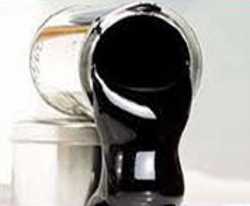Bitumen
-
Bitumen is a mixture of Organic Liquids that are highly Viscous, Black, Sticky, Entirely Soluble in Carbon Disulfide, and composed primarily of highly condensed Polycyclic Aromatic Hydrocarbons.
-
Naturally occurring or crude bitumen is a sticky, tar-like form of petroleum which is so thick and heavy that it must be heated or diluted before it will flow. At room temperature, it is much like cold molasses. Refined Bitumen is the residual (bottom) fraction obtained by fractional distillation of crude oil. It is the heaviest fraction and the one with the highest boiling point, boiling at 525 °C (977 °F).
-
Most bitumen contains sulfur and several heavy metals such as Nickel, Vanadium, Lead, Chromium, Mercury and also Arsenic, Selenium, and other Toxic Elements. Bitumen can provide good preservation of plants and animal fossils.
-
In British English, the word 'Asphalt' refers to a mixture of mineral aggregate and bitumen (or tarmac in common parlance). The word 'Tar' refers to the black viscous material obtained from the destructive distillation of coal and is chemically distinct from bitumen. In American English, Bitumen is referred to as 'Asphalt' or 'Asphalt cement' in engineering jargon. In Australian English, Bitumen is sometimes used as the generic term for road surfaces. In Canadian English, the word bitumen is used to refer to the vast Canadian deposits of extremely heavy crude oil, while asphalt is used for the oil refinery product used to pave roads and manufacture roof shingles. Diluted Bitumen (diluted with Naphtha to make it flow in pipelines) is known as dilbit in the Canadian Petroleum industry, while bitumen upgraded to synthetic crude oil is known as syn crude and syn crude blended with bitumen as syn bit.
-
Bitumen is primarily used for paving roads. Its other uses are for Bituminous Waterproofing Products, including the use of bitumen in the production of roofing felt and for sealing flat roofs.
-
We would like to serve your esteem company with our competitive prices and committed services.
